10 Questions to Avoid Poor Pre-Construction Condo Investments

Buying a pre-construction condo in downtown Toronto is a big decision and financial investment, and you should be informed and confident with the details of your potential new home. In order to get the best possible deal and also a safe investment from a reputable builder and developer, there are several questions you’ll want to consider along the way. The following questions are designed to help guide you through the process of buying a new condo in Toronto and avoid common mistakes that new buyers make.
- Who is the builder/developer and what is their experience? Who is the contractor?
Before purchasing a pre-construction condo, you will want to do some background research on who you’re purchasing from. Who are the condo developer and contractor? Do a quick Google search and see if you can find any potential red flags. If the developer and contractor sound good, check if they have experience building the type of condo and amenities that you’re looking for and that suit your lifestyle. Are they located in the city of your choice and do they have an extensive portfolio? - What can I afford?
In order to determine what unit you can afford, visit the developer’s website or the sales centre of the pre-construction condo you’re interested in. Many developers have affordability calculators on their websites that can help you figure out your budget and down payment, and if not, a sales centre staff member should be able to help you determine which unit is within your budget and what you can afford. You should also be aware of all the costs that come along with a pre-construction condo, including occupancy fees and closing costs. - What is the deposit structure?
Before investing in a pre-construction condo, make sure you know what the deposit structure is. A deposit structure is a payment schedule to pay off your down payment. Sometimes you can negotiate your deposit structure with the builder so that you can make your payments comfortably. - Will my deposit be protected?
The deposit for pre-construction condos in Toronto is typically 20% of the purchase price, although this varies. Even though your deposit is fully protected by the Condominium Act, you should always ask the developer what other security measures they have in place to protect your deposit. When purchasing a pre-construction condo from a respectable builder, your purchase fees should include a Tarion Warranty Corporation enrollment fee that protects your deposit in the case that the project is not completed. - When can I take possession?
Sometimes pre-construction condo projects can be delayed for months, and sometimes even years due to a variety of reasons. Most builders try to honour their commitments but sometimes things happen out of their control. First you will want to ensure that the builder has a good reputation for finishing projects on time, and second you will want to ask if they have a firm date of possession. Protect your investment by asking the condo developer what they will do if your possession date is delayed for any reason. You can also check the developer’s history in Tarion’s Builder Directory before committing to your purchase. - What is the outside date?
An outside date is the date a developer will give you if your pre-construction condo is not completed on time. Consider it as an extension date. Make sure you’re comfortable with this date, and ask the developer if they don’t complete the project on time, what are your options for backing out of your contract. - How many units remain in the building?
This number can tell you a few things – it can tell you how many people are interested in this building, and when construction will begin. If there are a high number of units remaining, it might be a while before the developer has enough capital to begin the construction phase. Then again, if you’re getting in early, you may be getting a better deal.

- How will I know if my condo will meet my expectations?
This again comes back to the reputation of the builder/developer. You need to do your due diligence and make sure the developer has experience and that they have a good track record of delivering on what they promise. Check out their previous condos and see if you like their style. If you purchase from a well-known builder, you shouldn’t have to worry that your condo will end up disappointing you. Another thing to consider is that you really need to know what you’re purchasing. Familiarize yourself with the project’s sales centre, ask questions, and study the floor plans and finishes, as well as the amenities spaces and renderings. Also, make sure that you’re happy with the neighbourhood in which the condo will be built.

- What if I have questions or concerns?
Purchasing a pre-construction condo can be overwhelming but is also very rewarding when you finally move into your unit. Ask the developer about their customer care, and what services they have in place to help you with any questions that may arise. Some developers have extensive customer care practices and will keep you updated on construction updates, occupancy dates and fees, etc. - Who will manage the building?
The builder is responsible for developing the building, selling units and the construction phase of the building, but usually another company is hired to manage the building once construction is complete. Find out who will manage the building and check into their reputation. - What other developments are coming to the area?
Ask the developer if they know of any other builders working in the area, and do a search online. Sometimes another condo development could end up blocking your view or the construction of another tower might make your investment less desirable. Find out what is happening in the neighbourhood.
Do you have any questions about how to avoid poor pre-construction investments? Connect with BAZIS on social media (Facebook, Twitter or Instagram) and let us know!
BAZIS is a Toronto Real Estate Development Company specialized in new construction condos for sale and pre-construction condos in Downtown Toronto. We are committed to excellence in every facet of the commercial and residential real estate development process. Combining visionary architecture, design, marketing and construction with the epitome of corporate integrity and environmental responsibility, BAZIS has become a major force in articulating Toronto’s ever-evolving skyline.
Toronto’s Inclusionary Zoning Policy Aims to Create More Affordable Housing

In November 2021, Toronto City Council adopted a new Inclusionary Zoning policy framework. The City of Toronto is the first city in Ontario to implement inclusionary zoning, which will ensure that more affordable housing is built across the city.
In the last five years, only 2% of housing that has been built or approved in Toronto has been affordable. The areas in Toronto with the largest amount of new housing are also experiencing substantial price escalation to the point where many Torontonians are struggling with housing affordability.
Inclusionary zoning is a tool to ensure that major Toronto neighbourhoods provide housing options that are suitable for a wide range of households and incomes. In the City’s policy, ownership prices will be centred on new income-based definitions of affordable housing, targeting households earning too much for social housing but not enough to afford market prices. These low- to moderate-income households fall in the 30-60 percentile of income distribution. This includes households earning $32,000-$92,000 per year, depending on household size.
Toronto City Council approved an Inclusionary Zoning Official Plan amendment, a Zoning Bylaw amendment and draft Implementation Guidelines, which will make it compulsory for some new developments around Protected Major Transit Stations Areas (PMTSAs) – for example, the TTC – to include affordable rental and ownership housing units beginning on September 18, 2022.
Inclusionary Zoning will secure 5-10% of certain condominium developments (the development must have at least 100 units, and have over 8,000 sq. ft. of residential gross floor area to qualify) as affordable housing, increasing gradually to 8-22% by 2030. The amount of affordable housing will vary depending on where the development is located in the city and whether the units are intended for ownership or rental. The highest requirements for affordable housing will be in the Downtown Toronto area, followed by Midtown and Scarborough Centre.
The City has established three Inclusionary Zoning Market Areas (as pictured below). These areas have the highest amount of new housing supply with significant price escalation where the City has determined that its inclusionary zoning requirements should not affect overall development viability. The three areas are subject to different inclusionary zoning requirements based on their individual market conditions.
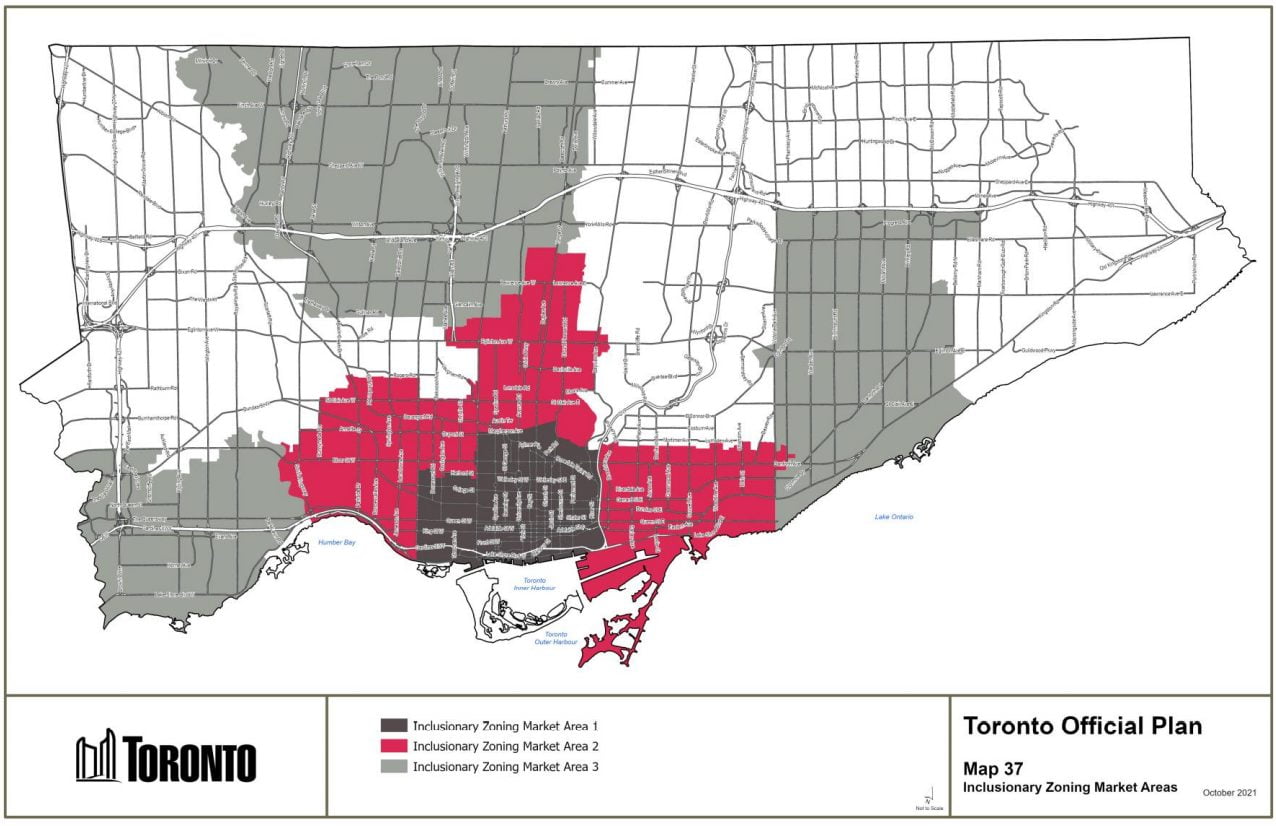
Image: City of Toronto By-Law 940-2021
The requirement for future condominium developments is broken down as follows:

Image: Aird Berlis
Toronto’s Inclusionary Zoning framework ensures affordability is maintained for 99 years, and that the by-law requirements be incorporated on a steady basis. The policy will be closely examined and reviewed after one year to allow for any changes that may be required to ensure market stability and the continued production of affordable housing units.
The resulting Inclusionary Zoning framework will help the City of Toronto reach the HousingTO Action Plan target of approving 4,000 new affordable ownership homes and 40,000 affordable rental homes by the year 2030.
Do you have any questions about inclusionary zoning in the City of Toronto? Connect with BAZIS on social media (Facebook, Twitter or Instagram) and let us know!
BAZIS is a Toronto real estate development company specialized in new construction condos for sale and pre-construction condos in Downtown Toronto. We are committed to excellence in every facet of the commercial and residential real estate development process. Combining visionary architecture, design, marketing and construction with the epitome of corporate integrity and environmental responsibility, BAZIS has become a major force in articulating Toronto’s ever-evolving skyline.
5 Things to Know About Buying a Pre-Construction Condo
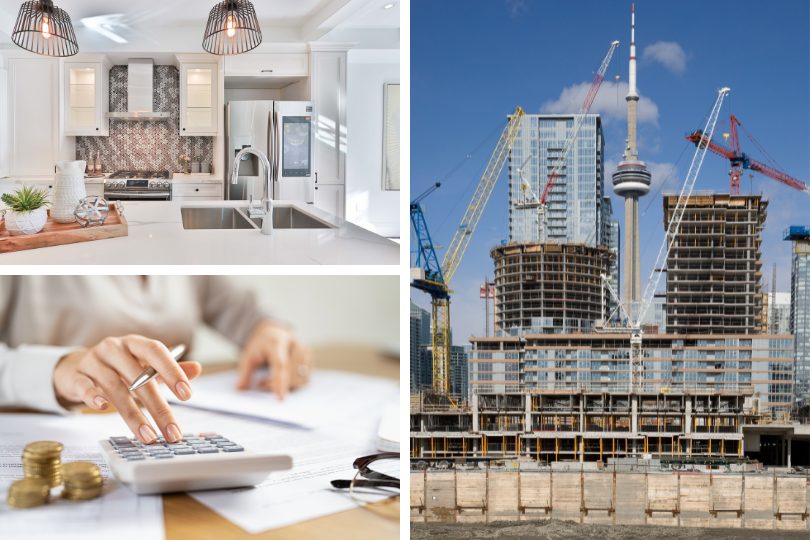
Buying a pre-construction condo is incredibly exciting. It gives buyers the chance to live in a brand new home that has never been lived in before, so it’s completely fresh and clean. Pre-construction condos can be customized to suit homeowners’ personal style, from the floor plan and layout to the flooring and cabinetry. Plus, it’s thrilling to watch your new home come to life before your eyes.
However, it’s easy to get caught off guard with the financing of a pre-construction home. To make the process a little bit easier, we’re breaking down the financial process and explaining what you need to know about deposit structure, the cooling-off period, occupancy fees, and closing costs. Costs vary depending on the value of the home, municipality, and the builder, so read on to learn more.
Deposit Structure
The down payment for resale condos can be as little as 5%, however pre-construction condos typically require 20%. The good news is that it gets paid in installments, giving the buyer more time to save up. A typical deposit structure is $5,000 with the offer, and then 5% increments at 30 days, 90 days, 180 days, and at final occupancy. The exact timing depends on the builder, and some developers even offer pre-launch deposit structures that are even more manageable, for example, your deposit may be split over 365 days instead of 180. Deposits often tend to be higher at the beginning of a project as banks and lenders require this, however deposit structures may become more flexible closer to completion, where a builder may be willing to negotiate your fee structure.
Cooling-Off Period
After putting down a deposit on a pre-construction condo, buyers are given a “cooling-off period.” During this time the buyer has some time to re-evaluate their purchase decision. Typically, the cooling-off period is 10 days in Ontario, so this would apply for all Toronto condos. At this time, the buyer should organize their finances and ensure they’re ready to move forward with the purchase. They should also take advantage of this time to review their Agreement of Purchase and Sale with a real estate lawyer to make sure they fully understand the builder clauses. If a buyer changes their mind during the 10-day cooling-off period, they are able to back out of the contract and have the deposit returned without deduction.
Occupancy Fees
After the condo is built and the buyer’s unit becomes available to move into, there is a period called interim occupancy. During this period, which can last a few weeks to several months, the buyer can take possession of their unit without actually owning it. This is because titles can’t be transferred until the whole building is complete. During this time, rather than paying their mortgage, the buyer will pay occupancy fees. The occupancy fee is made up of three parts: interest (usually 1%) on the unpaid balance of the purchase price of the condo, an estimate on the municipal taxes for the unit, and a projected common expense contribution to keep the building running. The fee is usually charged monthly. Many buyers will elect to take advantage of the interim occupancy period, as the payment may be less than their rent, and to take advantage of moving into their unit. A downside is that the building’s amenities may not yet be available to use, however the buyer can begin leasing out their space if they choose to do so.

Closing Costs
Closing costs are additional costs that the buyer will need to pay between the time they make their offer and the day they close. These costs include home inspection fees, legal fees, land transfer taxes, etc. Buyers should try to put aside an additional 1.5% to 4% of the purchase price of their homes, in order to cover these closing costs. Additional closing costs include: development and educational levies, a New Home Warranty Plan enrolment fee, utility hook-up fees, assignment fees (if you sell before final closing) and occupancy fees. These additional costs are builder- and project-specific, and some may even be included in the sale price of the unit.
It’s also important to keep in mind that when buying a pre-construction condo, buyers will need to contribute at least two months of condo fees to the condo’s reserve fund. Pre-construction condos are also subject to HST, which builders often factor into the purchase price of the unit and pay on behalf of the buyer. If a buyer is planning to live in the unit, they may qualify for an HST rebate.
Timing
When it comes to pre-construction condos, delays happen – and it’s not uncommon. Builders are permitted two extensions that last up to 120 days each. After that period, the developer must set a new date, and buyers are eligible for delayed closing compensation. If another year passes, the buyer can cancel their agreement.
With so many fees and closing costs, it’s no surprise that many pre-construction condo buyers feel overwhelmed at closing time. However, with due diligence and sound legal advice, buyers can confidently navigate the challenge of home financing and attain the home of their dreams.
Do you have any questions about purchasing a pre-construction condo? Connect with BAZIS on social media (Facebook, Twitter or Instagram) and let us know!
Pre-Construction Condos: Investing in Downtown Toronto

In this week’s blog post, we’re delving into the details of pre-construction condos – especially condos built in downtown Toronto – and answering all of your questions about them. If you’ve been wondering if a pre-construction condo is a good idea for you, how to decide on pre-construction versus resale, or the investment benefits of choosing a pre-construction condo, read on!
What is a pre-construction condo?
A pre-construction condo is just that – a condo that has not been constructed yet.
What are the benefits of investing in a pre-construction condo?
-Investing in Toronto pre-construction condos is a fantastic investment. It’s a great way to get into the Toronto real estate market and build equity.
-You get the thrill of personalizing your home to your unique style, while having a brand new home that no one has lived in before.
-You can choose your unit on a first-come-first-served basis. You get to select the view, floor plan, and layout that suit your lifestyle.
-Unlike a resale condo, you don’t have to pay your down payment all at once. When investing in Toronto pre-construction condos, you pay off your down payment in stages over the first year. This gives you more time, flexibility, and control over your finances.
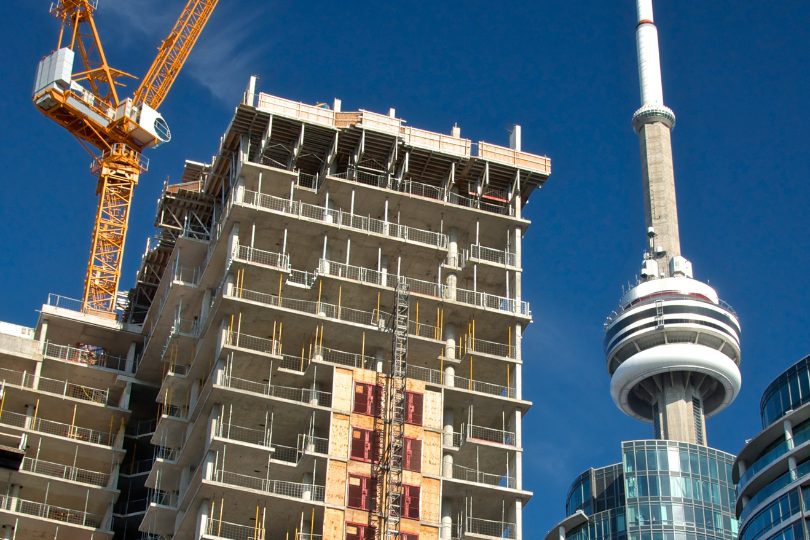
Why are pre-construction condos in Toronto a good investment?
-With rising home prices and shortages in the Greater Toronto Area, you can grow your money quickly if you invest in a pre-construction condo in Toronto. The value of a pre-construction condo increases the moment you take ownership (and even before then), and it generally continues to increase until you decide to sell. This is even truer if you invest in an up-and-coming neighbourhood.
-You get the lowest price possible. Builders and developers are looking to sell units to fund construction, so you get amazing value, and you can also avoid the stress of costly bidding wars.
-Pre-construction condos allow you to break into the real estate market at a slower pace, demand less money upfront, and give you the best appreciation value.
-Pre-construction condos offer better rental and resale value, because people would rather live in a new build rather than invest in properties that need maintenance or extensive renovations, or that have outdated features and finishes.
-The Toronto real estate market is hot right now and you can’t beat the location. Living in downtown Toronto gives you the advantage of being in close proximity to the best jobs, top universities, and all the entertainment options you can dream of. If you decide to sell your condo later on, you’ll have no difficulty finding someone who wants to live in downtown Toronto.

Who should consider investing in a pre-construction condo?
-Anyone and everyone! Pre-construction condos in Toronto are a great investment for young professionals, downsizers, and even families. Many condominiums offer 2-3+ bedrooms, and incredible amenities to suit all lifestyles.
Our upcoming Queen Church condo with Tridel, for example, is located in the heart of downtown Toronto. It’s perfectly situated nearby the Financial District, the University Health Network, the top universities and colleges in the city, and the best in entertainment. Queen Church also offers luxurious amenities that make life simpler and more enjoyable, including a state-of-the-art fitness centre, a pet run, BBQ and fireplace lounge, and much, much more.

Are you considering investing in a pre-construction condo? Are you interested in learning more about Queen Church? Connect with BAZIS on social media (Facebook, Twitter or Instagram) and let us know!
How Do Assignments Work When Purchasing a Pre-Construction Condo in Toronto?
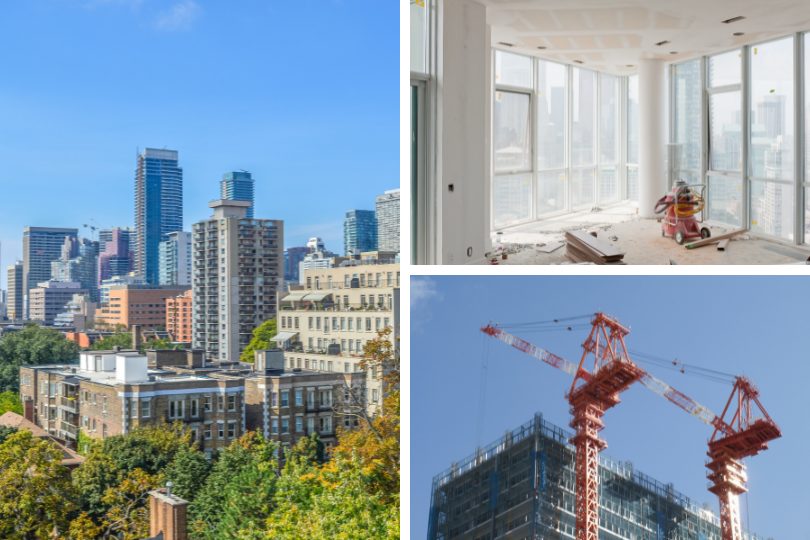
If you’ve purchased a new condo or are in the market to do so, you may have heard the term “assignment sale” and wondered what assignment sales are and how they work. Today, we’re breaking down everything you need to know about assignment sales.
What are assignment sales?
Assignment sales are a type of sale in which a buyer (assignor) sells their condo contract to a buyer (assignee) before the closing (move-in) date. Assignment sales occur for both homes and condos, however are most prevalent in pre-construction condos.

Why do people sell before their closing date?
When purchasing a pre-construction condo in Toronto, there can be a long wait time between the point of purchasing and the actual move-in date. It can sometimes take years before a condo is built and a buyer can move in. During that time, circumstances may change for the buyer. For example, the buyer may have accepted a job offer in another city, they may have gotten married and had kids and need a bigger space, or they may not be able to afford closing anymore. Another reason could be that the buyer bought the condo in an up-and-coming area and is now looking to make a profit on the sale. There are many reasons why a person may want to sell their pre-construction condo to another interested buyer.
How do assignment sales work?
Assignment sales can work in different ways depending on the builder. Some builders don’t permit assignments or allow them only if they are paid an assignment fee. So having the builder’s approval is the first essential step to proceeding with an assignment.
When a buyer makes an assignment sale, what they’re actually selling is the condo contract – not the condo itself, since they don’t actually own it yet (since it hasn’t been closed). They are passing along their contractual agreement with the builder to purchase the home – their right and their obligation.
The buyer purchases this right and obligation, and must abide by all the terms within the original contract with the builder, who is the original seller. The original buyer must sign an Agreement of Purchase and Sale, including an Assignment Agreement Clause.

The pros and cons of assignment sales
To break it down quickly, here are some of the main pros and cons of assignments.
Pros:
- Buyers (assignees) can purchase a brand new condo at a lower price
- The condo’s price/value will likely continue to rise as it’s being constructed
- Buyers can get into an amazing building that sold out
- Buyers benefit from all the perks of the original agreement, such as having their new condo be covered by the Tarion warranty program, which offers years of warranty against errors and defects with the condo unit, as well as provides warranties for newly-installed appliances; the original agreement may also include upgrades, credits, and capped developing charges from the builder
Cons:
- The builder must approve the transaction before it can go ahead
- There’s less ability to negotiate the price of the home, or the terms and conditions of the agreement, since buyers are inheriting the original purchaser’s contract
- Buyers (assignees) will be responsible for closing costs, which can sometimes include the education and development levies, Tarion legal fees, and HST on appliances
- Buyers will also be responsible for paying land transfer tax, municipal levies, legal fees and more
Are you considering investing in a pre-construction condo, and have you considered assignment sales? Connect with BAZIS on social media (Facebook, Twitter or Instagram) and let us know!
Are Pre-Construction Condos in Toronto a Good Investment?
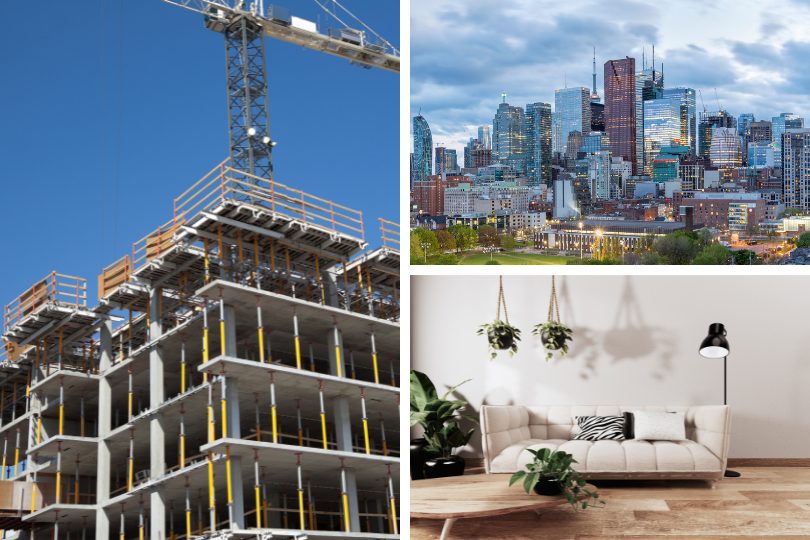
When you’re considering purchasing a condo as a homebuyer or investor, there are many potential prospects and benefits, however deciding whether to buy a pre-construction condo or a resale condo is where things get a bit more complicated. Investing in condos is a great way to get into the real estate market and build personal equity, and fortunately, experts are predicting 2022 to be the year of the condo due to rising home prices and shortages. Rest assured, the condo market is thriving in the GTA, and you can get into the market with a great purchase if you do your due diligence. So, now that you’ve decided to invest in a condo, which route should you go? Should you invest in a resale condo, or are pre-construction condos in Toronto a good investment?
Resale condos are a good idea if you’re looking to move in right away. Pre-construction condos, however, are just that – condos that haven’t been constructed yet. So when investing in a pre-construction condo, you could end up waiting for years for your condo to be built and it’s possible to face delays. Your personal plans could also change during this time. One of the major benefits of purchasing a resale condo in Toronto is that you can move in just days or weeks after you purchase your new home. Another benefit is that you have the ability to actually see the condo before purchasing, so you know exactly what you’re getting.

So what about purchasing a pre-construction condo in Toronto instead – why would you want to do that if it means waiting and not getting to see what you’re buying? Well, purchasing a pre-construction condo is the best way to grow your money, and it also gives you the thrill of getting to personalize your new home to suit your style – not to mention the delight of having a brand new home that no one has ever lived in before.
When you invest in a pre-construction condo, the value increases the moment you purchase, and it continues to appreciate until the day you move in and then eventually sell. Most people prefer to buy new, so from an investment perspective the value of your pre-construction condo will increase more than that of a resale condo, which could end up costing you more in costly repairs and renovations.
When purchasing a pre-construction condo, you’re essentially purchasing a condo that’s unseen, so you want to invest in a reputable builder. Although it can be a bit daunting to invest in something you can’t see, there are great advantages. When you invest in a pre-construction condo you get the lowest price possible. Builders and developers are looking to sell units efficiently to fund construction, so you get incredible value. You can avoid the stress of costly bidding wars. You also get the first appreciation, and if you invest in an up-and-coming neighbourhood, you can see the value on your return increase immediately.
For many homeowners, one of the major benefits of purchasing a pre-construction condo is that you get more options to customize your space according to your wishes and needs as well as your personal style. You can choose units based on a first-come-first-served basis, and you can select the floor plan, layout and view that suit your lifestyle. When investing in a resale condo, you buy the condo as is and whatever changes you want to make will come at an extra cost.
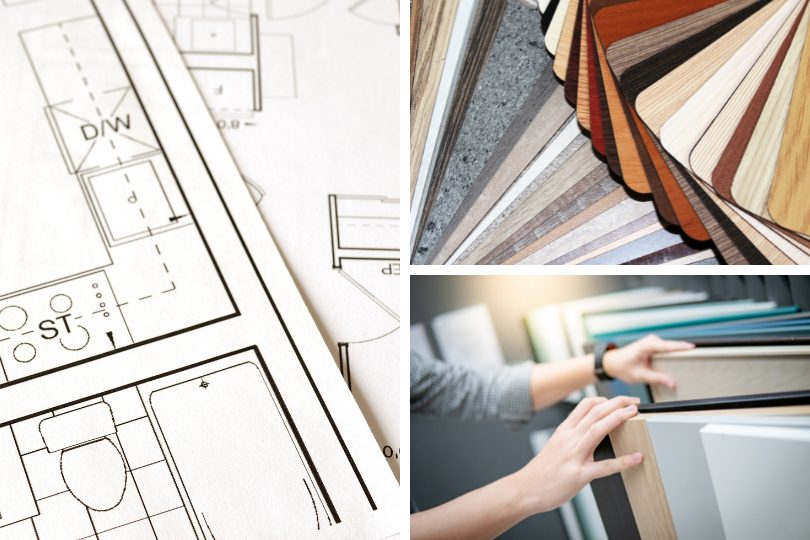
Another thing to consider when choosing to purchase a resale condo versus a pre-construction condo are the fees needed upfront at the time of purchase. In a resale condo, you will need to put down a down payment and acquire a mortgage from the bank, which you would pay over a term, typically 25 years. The advantage of investing in a pre-construction condo is that you don’t have to pay your down payment all at once. You pay it off in stages over the first year, giving you more time, flexibility and control over your finances. Also, if you’re looking to invest in a property to rent out to tenants, if you decide to purchase a resale condo you will need to find tenants immediately to take over your mortgage whereas with a pre-construction condo, you have time to sort out your affairs.

The biggest advantages of investing in a resale or pre-construction condo is that both options are a great investment opportunity, and the value of your condo will continue to increase until you are ready to sell. This is especially true in Toronto right now as the demand for housing and real estate development is continuing to favour upward and vertical expansion.
The main question you want to keep in mind is when you’re looking to occupy the unit. If you’re looking to move in immediately, then resale is the way to go, but it’s important to note the benefits of a pre-construction condo. Pre-construction condos allow you to break into the real estate market at a slower pace, demand less money upfront, and give you the best appreciation value and the most options when it comes to customizing and designing the space based on your needs and personal style. Pre-construction condos also offer better rental and resale value than resale condos, because people would typically rather live in a new build rather than invest in properties that need maintenance or extensive renovations, or that have outdated features and finishes. So, are pre-construction condos in Toronto a good investment? Absolutely.
Are you considering investing in a pre-construction condo? Do you have questions about the difference between resale and pre-construction condos? Connect with BAZIS on social media (Facebook, Twitter or Instagram) and let us know!
Taking a Look at Toronto’s Fall 2021 Real Estate Market Positive Outlook
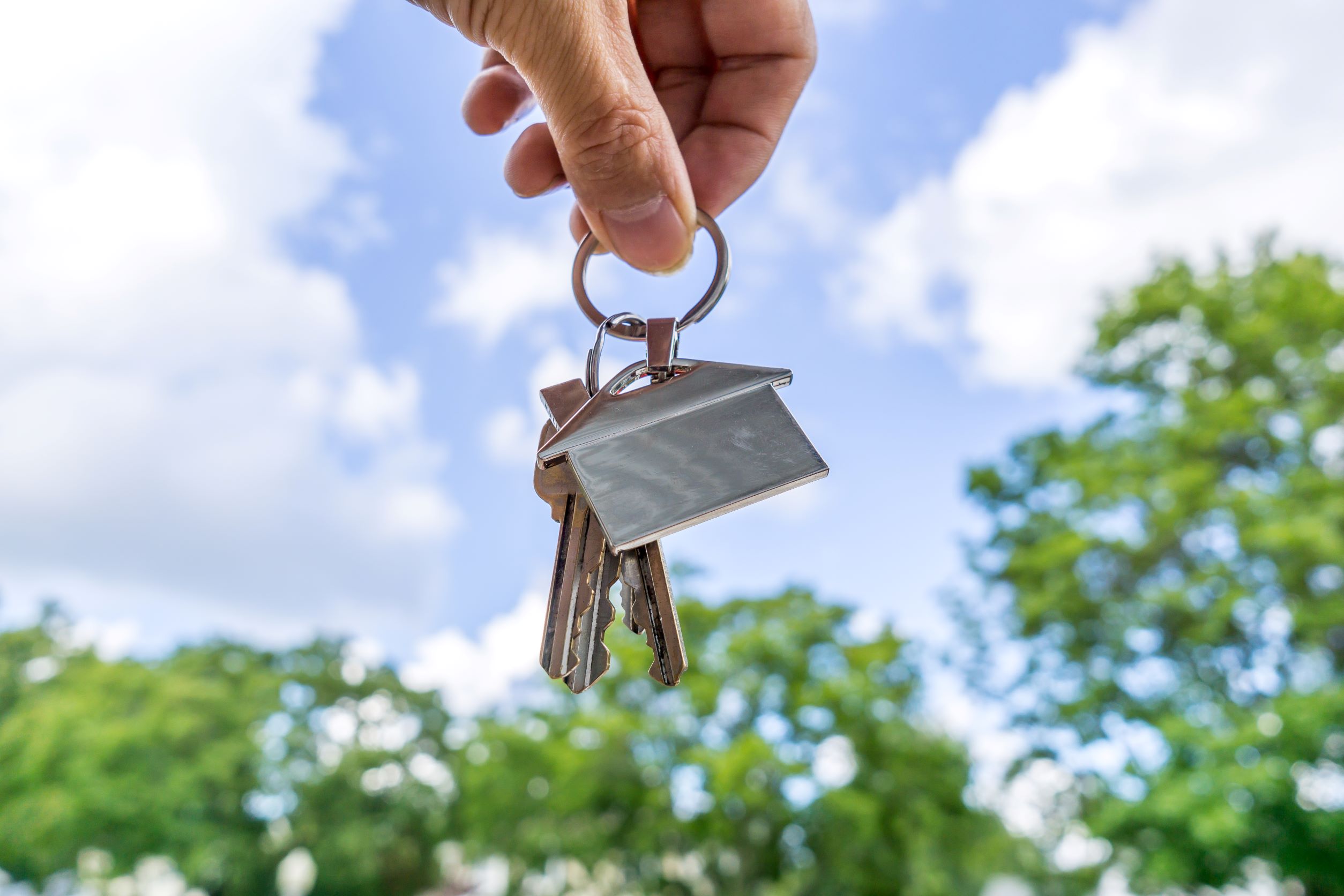
The pandemic has been a turbulent time for real estate in the Greater Toronto Area (GTA) and Canada at large. Whether you’re contemplating purchasing your first new home or condo, moving to a larger home, downsizing, or investing in real estate, you’re likely interested in the market and in being kept apprised of the latest trends and developments.
According to the Toronto Regional Real Estate Board (TREB), total residential real estate transactions were down 18% last month compared to the year before (9,046 transactions in September of 2021, compared to 11,033 transactions in September of 2020), and total new listings were down 34% compared to last year (just 13,483 listings in September of 2021, compared to 20,441 listings in September of 2020). The sharp decline in listings and smaller decline in transactions shows that there is a lack of supply in the GTA real estate market, so it’s not surprising to see that the average selling price increased 18.3% year over year (for an average of $1,136,280 in September of 2021, compared to $960,613 in September of 2020). Listing days on the market have also decreased (14 days in September of 2021, compared to 16 days in September of 2020).
With new home and condominium prices on a steady upward swing – with no sign of stopping – the best time to buy real estate in the GTA is, as always, as soon as possible.
RBC’s latest Housing Trends and Affordability Report, which measures affordability based on ownership costs as a percentage of household income, rose to a 30-year high in the second quarter of 2021. In Toronto, the report shows that the share of income a household would need to cover ownership costs is, on average, 59.1%.
The share of income necessary to cover the costs of owning a single-family detached home in the GTA is rising rapidly, making this dream more and more difficult for families to achieve. Soaring demand for detached homes during the pandemic made these homes’ prices increase even more. Fortunately, owning a condo apartment continues to be a more affordable option for many families, young professionals, and empty nesters and downsizers. Semi-detached homes and townhomes are also great options that offer much more value than fully-detached single family homes.
The strong real estate market can make getting into the market a challenge, but is good news for home owners and investors. For those considering purchasing a home or condo, the time is now. Toronto’s real estate market is strong and will have many opportunities for sellers, buyers, and investors alike.
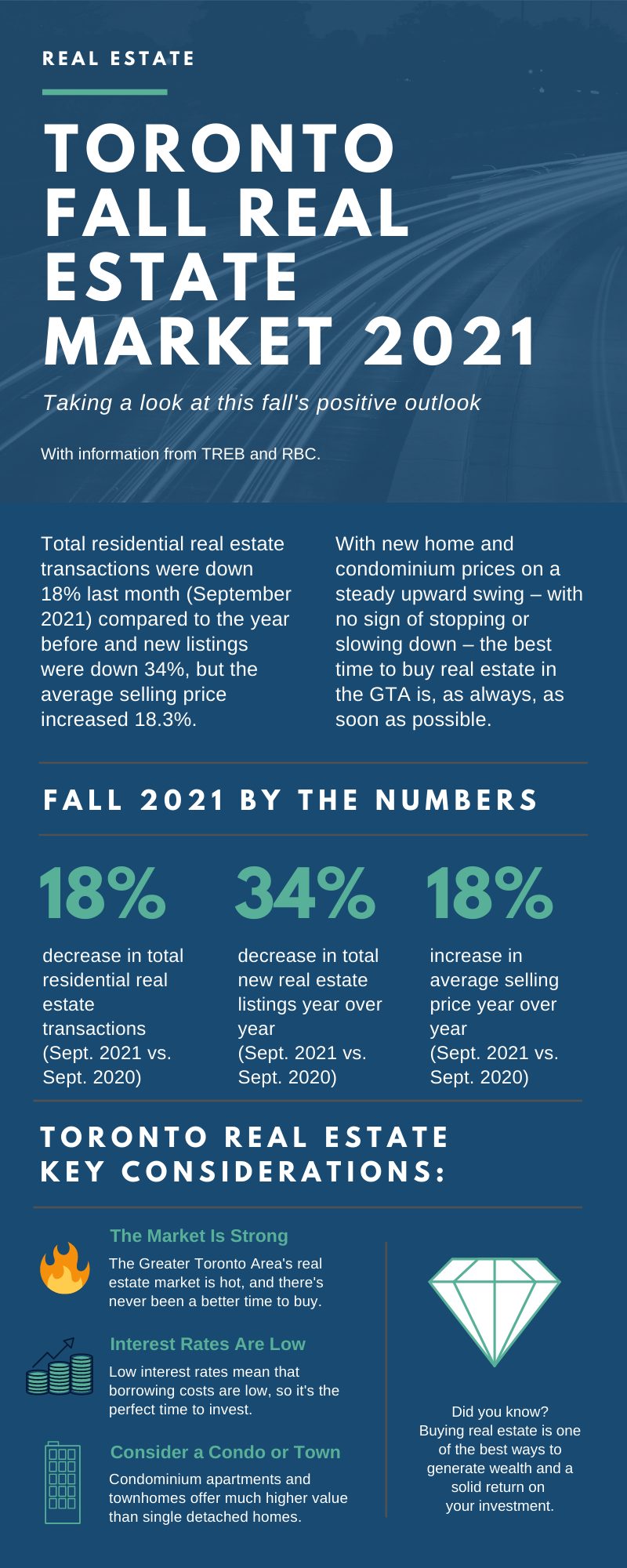
Do you have questions about the Toronto real estate market? Connect with BAZIS on social media (Facebook, Twitter or Instagram) and let us know!
5 Important Steps for First-Time Home Buyers in the Greater Toronto Area

As a first-time home buyer, the process of finding, financing, and purchasing your first new home or preconstruction condo in Toronto can be quite daunting. It requires taking a big leap of faith, and the experience can be accompanied by stress and worry.
If you’re a first-time home buyer in the Greater Toronto Area, we’ve written up a helpful outline of some of the key steps that you should take into account on your home buying journey. By following these easy steps, you’ll find that the process is relatively straightforward. With the right knowledge and tools in your toolkit, along with the right team, you can let go of the stress and embrace this exciting opportunity!
Step #1: Obtain a Mortgage Pre-Approval
A lot of people avoid the step, but acquiring a mortgage pre-approval can save you quite a bit of time. Best of all, getting a pre-approval from the bank is simple. Just set up an appointment with your preferred bank, and they’ll be able to guide you through the process. This can also be done virtually.
The bank will generally be looking at the following:
- Your income
- Any debts you have, such as credit card balances or loan payments
- Your credit history and credit score
- How much you have saved up for your down payment
Once you’ve completed the pre-approval process, shopping for your perfect new home or preconstruction condo in Toronto will be a lot easier and quicker. Having a pre-approval allows you to pinpoint exactly what your budget is and how much your monthly payments will be, putting you in a position where you can find the perfect home for you much more easily, comfortably, and realistically.

Step #2: Get the Right People Involved
The next step in the process of buying your first new home or preconstruction condo in Toronto is getting the right people involved. Wouldn’t it be lovely if you could just do it all yourself? Well, you could, but since buying your first home is one of the biggest purchases you’ll ever make and a major investment opportunity, it’s better to have a full team backing you before you make the final decision.
In any given scenario, these are the people that you’ll need to be in contact with when purchasing your first home or preconstruction condo in Toronto:
- A real estate lawyer – for all the legal implications of purchasing your home, and to help you review all legal documentation
- A lender – for an outline of your financing options on your home
- A real estate agent – to scour the market for your dream home and to help you with making an offer, negotiating, and getting the best price
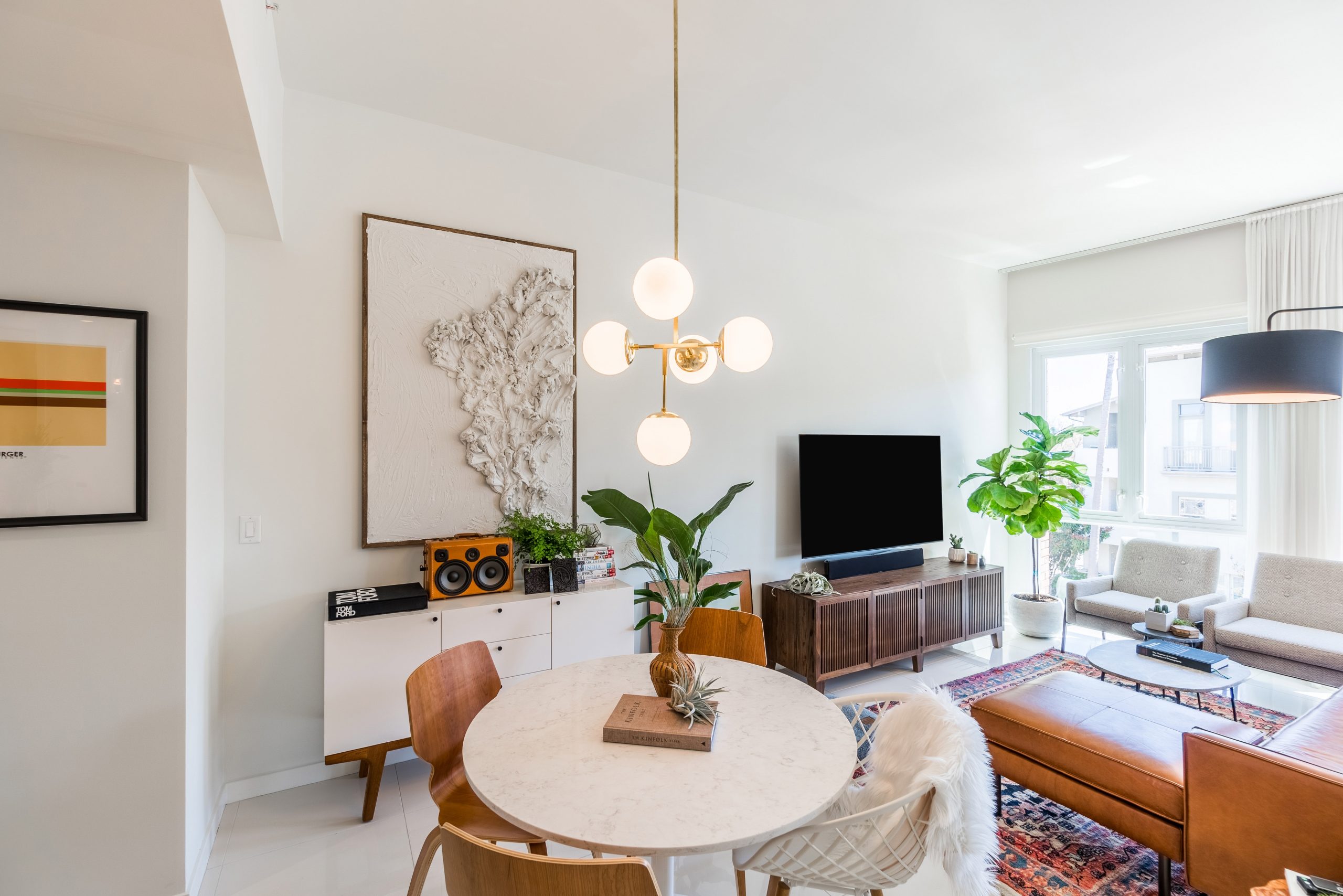
Step #3: Go House Shopping!
This is probably the most exciting part about buying your first new home or preconstruction condo in Toronto – the search! Now that you have a mortgage pre-approval and a team behind you, you’re ready to get into the market. Screening listings online and going in person to check them out is an exciting step in the home buying process. Make sure you’ve refined your criteria and that you know exactly what you want – like number of bedrooms, your ideal neighbourhood, and so on. Once you’ve done this, pinpointing which home on the market suits you will be a breeze.

Step #4: Submit Your Offer
So, you’ve found your dream home or preconstruction condo in Toronto and now it’s time to take the big step of making an offer. Ideally when you submit an offer it should be in writing, which automatically becomes a legally binding document. It will cover things such as the price you’re prepared to pay, how much down payment you’re willing to put down, the closing date, and any other things you and the seller have agreed upon.

Step #5: Closing and Moving In
There’s only one thing that’s more exciting than shopping for your new home – moving in! Your closing date is the date that you can move in to your new home or condo. The process of closing the sale and having you become the owner is straightforward, and most of it will be handled by your real estate lawyer.
Moving in means that it’s time to start painting, decorating, and making your new home or preconstruction condo truly yours. What could be more exciting than that?
Are you a first-time home or preconstruction condo buyer in the GTA? Questions? If you need support, join us on our social media pages (Facebook, Twitter and Instagram) and reach out!
10 Things to Consider Before Buying a New Townhome in North York
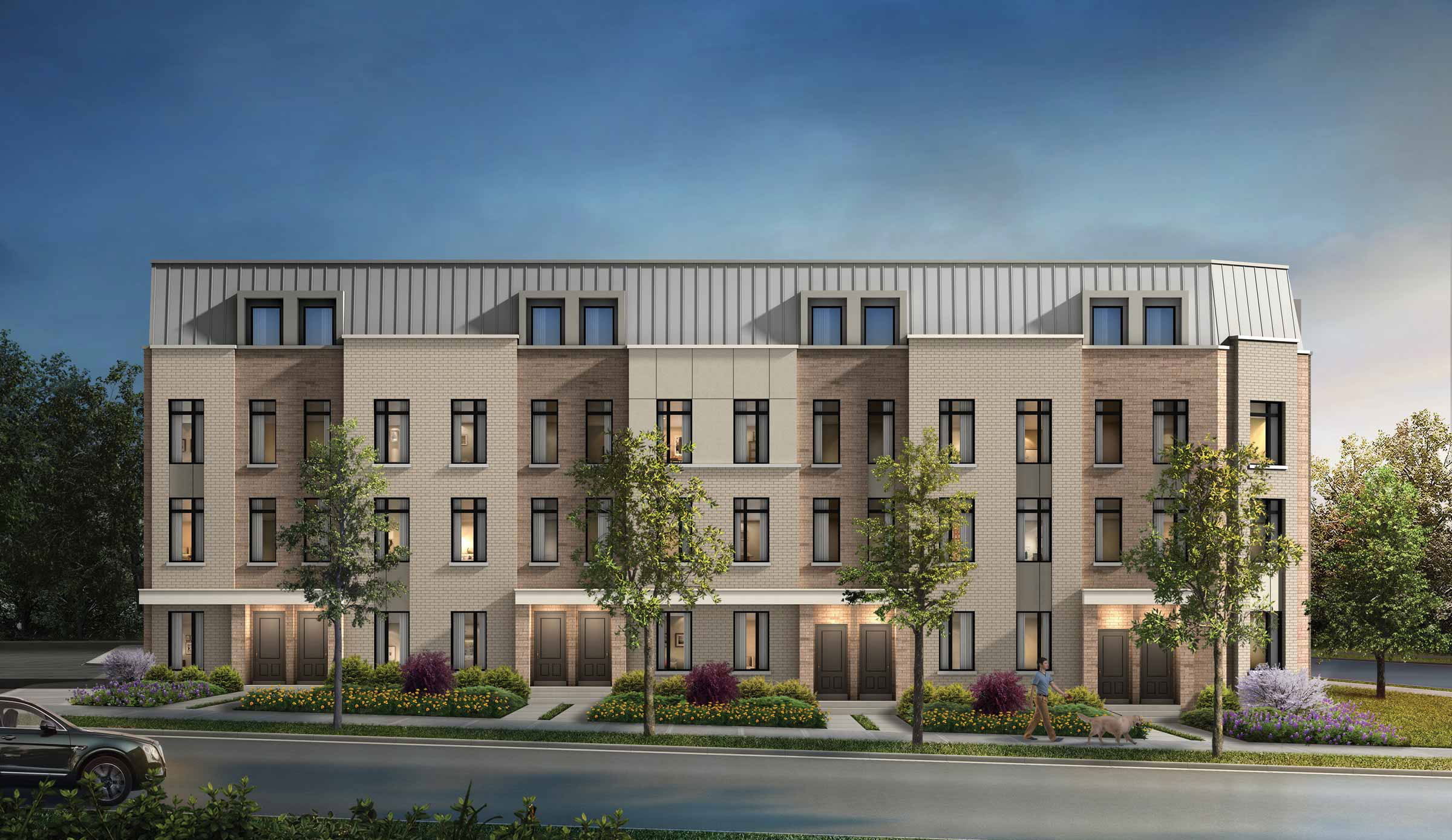
Buying a new home, townhome, or condo is a big investment and a decision that will impact your and your family’s lifestyle for years to come. If you’ve settled on the idea of buying a townhouse in North York, this blog post is for you.
Townhomes are a great option for families who are looking for their own home – with the spaciousness and privacy of a detached home – but with all the convenience and ease of condo living. As we outlined in a previous blog post about the benefits of townhome living, townhomes typically include multiple floors, designated parking spaces, and a shared wall with another home or homes. Townhome communities usually include shared communal spaces and are generally regulated by a homeowners’ association, which ensures that community maintenance and upkeep are taken care of and that everyone in the community abides by certain rules or guidelines. The benefits of buying a townhome include cost savings and affordability, amazing locations, single family living without the maintenance, a community vibe, and stunning shared spaces.
Not sure what the differences are between a townhome and a condo when it comes to home ownership, legal statutes, and privacy? Check out our blog post “Townhomes vs. Condos: Do You Know the Differences?”
If you’re going to buy a townhome specifically, there are unique considerations that you should take into account before making your decision. Here are 10 things to consider before you buy a new townhome in North York:
#1: Your Budget
First things first: before shopping for a townhome, get a mortgage pre-approval and know the budget that you’re working with. This will help you to shop smart, to not fall in love with properties that are out of your means, and to be able to act quickly once you’ve found “the one” (you’ll know it when you find it!).
Townhomes often offer good affordability because they’re less expensive to build compared to single detached homes, due to the high land costs in the Greater Toronto Area.
Using a mortgage affordability calculator is a good place to start if you’re not sure of what your budget is.
#2: Where You Want to Live
Location, location, location – it matters! Before buying a new townhome in Toronto, consider its location and if it’s in an area that you would truly like to live in. Things to consider about a neighbourhood include:
- Its proximity to major highways and transit options such as buses, subway or light rail transit (LRT) – both existing and upcoming/under construction are important to consider
- The schools in the area (their quality and whether there are options for French Immersion or Montessori, if you’re looking for those)
- The proximity of other community and family-friendly amenities such as daycares, libraries, community centres, restaurants, shops, grocery stores, salons, movie theatres, museums, attractions, and so on
- Its walk score and how many places you would be able to walk to on a daily basis (as well as whether or not the neighbourhood is pedestrian-friendly)
- Its bike score and how many nearby parks/green spaces there are to explore
- How close or far it is from your work, your family or friends’ homes, etc.
#3: Your Desired Lifestyle
How do you want to live? Do you enjoy walking to nearby shops and restaurants, or biking along natural trails? How do you get to work – walk, take transit, or drive? Do you have a family? How many kids? How about a dog? How much free time do you have on a typical weekday? How do you like to spend your weekends? All of these questions will have an effect on the type of lifestyle that you like to live.
Low-maintenance living can be yours with a townhome purchase, although townhome owners do have more maintenance to take care of than condominium or apartment owners. Because they’re smaller lots, townhomes are usually quite easy to maintain – and you won’t have to worry about exterior maintenance such as clearing snow or driveway repairs.
Many busy families today love the idea of maintenance-free living. A townhome lifestyle can give you more time to focus on what matters most: spending time with your family.
You’ll also want to find a townhome community that has a vibe that matches the lifestyle you’re looking for. Are the homeowners social and neighbourly, or do they stick more to themselves? Are there community events? Take these factors into consideration before buying a townhome.
#4: Homeowner Fees
Townhomes that have communal areas and shared common elements typically have a homeowners’ association, which is responsible for managing the neighbourhood’s common areas such as roadways and parks. If there’s a homeowners’ association, there will be fees associated with the management of these shared elements.
Before choosing a townhome to purchase, you’ll want to know whether it has a homeowners’ association and what the monthly fee costs, as well as what it covers or doesn’t cover. Make sure to factor this cost into your financial calculations and monthly budget.
For example, at our Bartley Towns community, the townhomes share a common element – the roadway – and so there is a monthly maintenance fee, although it’s quite low at just $113.95 per month.
#5: Mortgage Rates
Make sure you’re up to date on all the latest mortgage rules and regulations and take your time shopping around for the best rate. It’s always a good idea to compare mortgage rates from at least three different lenders.
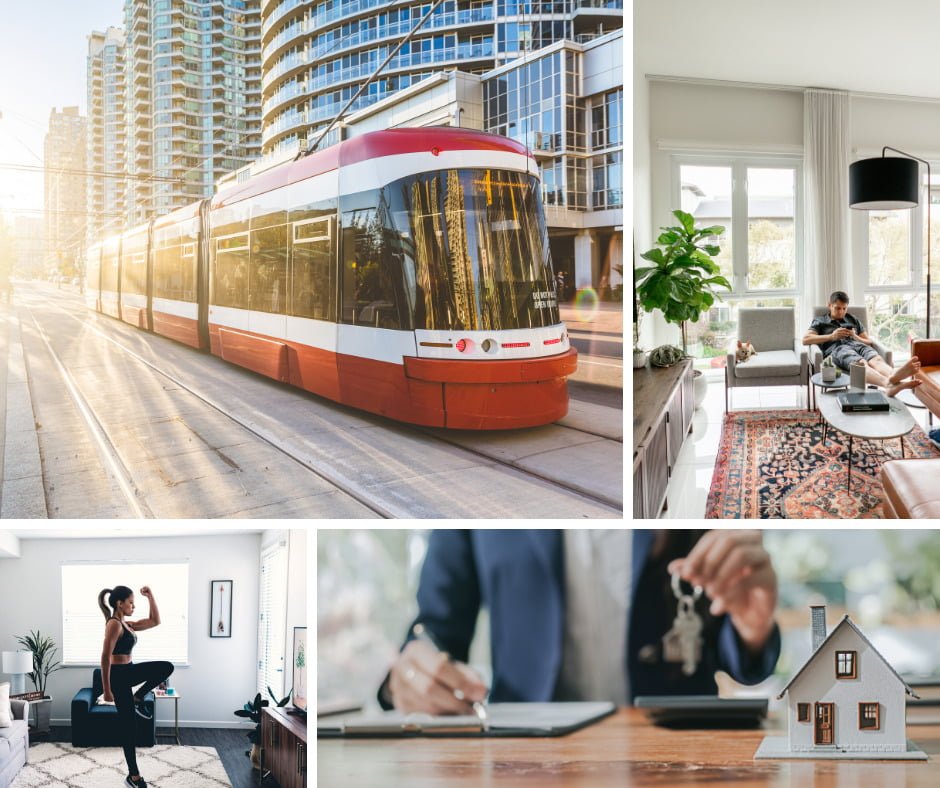
#6: Community
When you buy a townhome, you don’t exist on an island – you become part of a community. This goes beyond the location or neighbourhood. A community consists of the people who live in the neighbourhood and the unique fabric that they weave together. Is the community diverse, friendly, and accessible? Do neighbours say hello to each other and maintain relationships? Do you get a good feeling when you walk through the community and when you visit the local shops? Find a community that feels a bit like home already, and before you know it you’ll be an integral part of it.
#7: Privacy and Personalization
Townhome communities have various degrees of privacy, based on the townhomes’ construction (how thick the walls are and how well they are sound-proofed) as well as the layout of the townhome designs (whether they’re stacked or not, for example). Make sure to talk to the builder (for a new townhome build) or neighbours (for an older build) to get an idea of what you can expect and to see if it suits your lifestyle.
You’ll also want to know what the rules are in terms of personalization, both to your new townhome’s interior and the exterior. Many townhomes have rules about what changes you’re allowed to do to the home’s exterior, for example.
#8: Style and Design
Just as you’d explore the features and finishes of a condominium or detached home before buying, you’ll also want to see if a townhome’s design suits your style before making the plunge. Details like flooring and kitchen countertops can be costly to replace, so you’ll save money and time if you purchase a home that you love right off the bat.
You’ll also want to consider the home’s layout and make sure that the floor plan works for you and your family.
#9: Amenities
Many townhome communities come with shared amenities or communal spaces such as driveways, roadways, parks, and sometimes even pools, gyms, or saunas. Determine which amenities are important to you and worth the extra cost, and then check out which amenities the townhome you’re looking at has.
#10: Builder
Lastly, know your builder. Buying a townhome from a reputable builder with a history of building and developing exceptional communities will secure your investment and put your mind at ease.
BAZIS has a long reputation of designing luxurious living spaces with the utmost attention to detail. Being able to successfully combine visionary architecture and design with marketing and construction has turned BAZIS into a reckoning force in pronouncing the city’s landscape.
The company is known for the unique architecture and high standards of luxurious finishes of its various residences. Knowing that each of BAZIS’ developments is crafted with exquisite design, superior location and elaborate amenities will give you peace of mind.
Make sure to follow BAZIS on social media (Facebook, Twitter and Instagram) for more tips, info, and industry updates.
